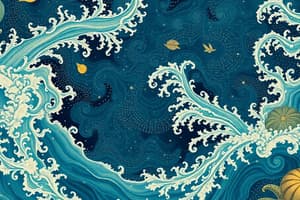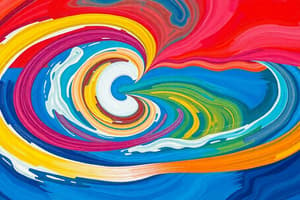Podcast
Questions and Answers
What is the primary driver of surface ocean currents?
What is the primary driver of surface ocean currents?
- Wind and Coriolis force (correct)
- Density differences
- Thermohaline circulation
- Ocean floor shape and depth
Which of the following factors does not influence ocean currents?
Which of the following factors does not influence ocean currents?
- Tides
- Earth's magnetic field (correct)
- Salinity
- Ocean floor shape and depth
What is the primary driver of deep-water ocean currents?
What is the primary driver of deep-water ocean currents?
- Density differences
- Thermohaline circulation and wind (correct)
- Tides and ocean floor shape
- Wind and Coriolis force
What is the term for the large-scale circulation of ocean water that connects different ocean basins?
What is the term for the large-scale circulation of ocean water that connects different ocean basins?
What is the primary function of the Gulf Stream?
What is the primary function of the Gulf Stream?
Which of the following ocean circulation patterns is responsible for distributing heat from the equator to the poles?
Which of the following ocean circulation patterns is responsible for distributing heat from the equator to the poles?
What is the term for the apparent deflection of moving objects on Earth due to Earth's rotation?
What is the term for the apparent deflection of moving objects on Earth due to Earth's rotation?
What is the primary importance of ocean circulation?
What is the primary importance of ocean circulation?
What is the main focus of Sequence Stratigraphy?
What is the main focus of Sequence Stratigraphy?
What is a depositional sequence in Sequence Stratigraphy?
What is a depositional sequence in Sequence Stratigraphy?
What is the main application of Sequence Stratigraphy in the oil industry?
What is the main application of Sequence Stratigraphy in the oil industry?
What is the term for a package of sediments deposited during a specific phase of a sequence?
What is the term for a package of sediments deposited during a specific phase of a sequence?
How do ocean currents affect sediment deposition?
How do ocean currents affect sediment deposition?
What drives thermohaline circulation?
What drives thermohaline circulation?
What is the importance of understanding ocean circulation patterns in sedimentology?
What is the importance of understanding ocean circulation patterns in sedimentology?
What is the result of sediments being transported by ocean currents?
What is the result of sediments being transported by ocean currents?
What is the role of ocean currents in shaping sediment distribution?
What is the role of ocean currents in shaping sediment distribution?
What is the effect of ocean circulation on sedimentary facies?
What is the effect of ocean circulation on sedimentary facies?
Flashcards are hidden until you start studying
Study Notes
Ocean Currents
- Definition: Ocean currents are the movement of ocean water in a specific direction
- Types:
- Surface currents: driven by wind, Coriolis force, and tides
- Deep-water currents: driven by density differences, thermohaline circulation, and wind
- Factors influencing ocean currents:
- Wind: wind stress, wind direction, and wind speed
- Coriolis force: apparent deflection of moving objects on Earth due to Earth's rotation
- Tides: gravitational pull of moon and sun
- Ocean density: salinity, temperature, and depth
- Topography: ocean floor shape and depth
Ocean Circulations
- Definition: Large-scale circulation of ocean water that connects different ocean basins
- Types:
- Thermohaline circulation (THC): driven by changes in temperature and salinity
- Wind-driven circulation: driven by wind stress and ocean currents
- Global ocean circulation patterns:
- Gulf Stream: warm ocean current in the North Atlantic
- Kuroshio Current: warm ocean current in the North Pacific
- Antarctic Circumpolar Current (ACC): cold ocean current surrounding Antarctica
- Importance of ocean circulation:
- Heat transport: distributes heat from equator to poles
- Nutrient distribution: affects marine life and productivity
- Climate regulation: influences global climate patterns
- Ocean-atmosphere interaction: CO2 absorption and carbon sequestration
Ocean Currents
- Ocean currents are the movement of ocean water in a specific direction, driven by various factors.
- There are two main types of ocean currents: surface currents and deep-water currents.
- Surface currents are driven by wind, Coriolis force, and tides.
- Deep-water currents are driven by density differences, thermohaline circulation, and wind.
- Wind influences ocean currents through wind stress, direction, and speed.
- The Coriolis force, resulting from Earth's rotation, deflects moving objects, including ocean currents.
- Tides, influenced by the gravitational pull of the moon and sun, also impact ocean currents.
- Ocean density, determined by salinity, temperature, and depth, affects ocean currents.
- Topography, including ocean floor shape and depth, influences ocean currents.
Ocean Circulations
- Ocean circulations refer to the large-scale circulation of ocean water that connects different ocean basins.
- There are two main types of ocean circulations: thermohaline circulation (THC) and wind-driven circulation.
- Thermohaline circulation is driven by changes in temperature and salinity.
- Wind-driven circulation is driven by wind stress and ocean currents.
- The Gulf Stream, a warm ocean current, is located in the North Atlantic.
- The Kuroshio Current, also a warm ocean current, is located in the North Pacific.
- The Antarctic Circumpolar Current (ACC), a cold ocean current, surrounds Antarctica.
- Ocean circulation plays a crucial role in:
- Distributing heat from the equator to the poles.
- Affecting marine life and productivity through nutrient distribution.
- Regulating global climate patterns.
- Influencing ocean-atmosphere interaction, including CO2 absorption and carbon sequestration.
Sedimentology
Sequence Stratigraphy
- Study of stratigraphic arrangement of sedimentary rocks in terms of depositional sequences
- Focuses on cyclical nature of sedimentation, erosion, and deposition
- Depositional sequence: succession of sediments deposited during a single cycle of sea-level change
- Systems tract: package of sediments deposited during a specific phase of a sequence
- Parasequence: smaller, genetically related group of sediments within a systems tract
- Applications:
- Hydrocarbon exploration: identifies potential reservoir rocks and source rocks
- Paleoclimate reconstruction: provides insights into past sea-level changes and climatic fluctuations
Ocean Circulations and Sedimentation
- Ocean currents shape sediment distribution and deposition
- Major ocean circulation patterns:
- Thermohaline circulation: driven by temperature and salinity changes
- Wind-driven circulation: driven by wind stress
- Tidal circulation: driven by gravitational forces
- Effects on sedimentation:
- Sediment transport: ocean currents transport sediments across the ocean floor
- Sediment deposition: sediments deposited in areas of low current energy or at the base of slopes
- Sediment redistribution: sediments redistributed by ocean currents, affecting final depositional site
- Importance in sedimentology:
- Reconstruct past oceanic conditions and sedimentary environments
- Affects distribution of sedimentary facies and formation of sedimentary basins
Studying That Suits You
Use AI to generate personalized quizzes and flashcards to suit your learning preferences.




